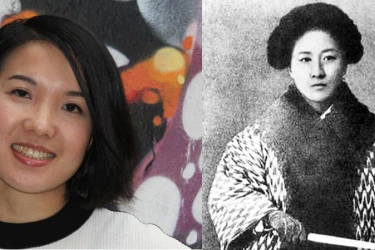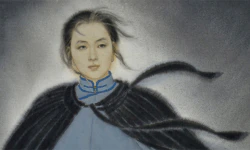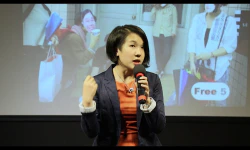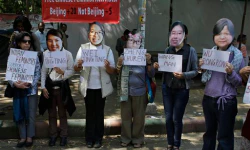
Past and Modern, two figures of Chinese Feminism
China is a country with a gigantic history but often obscured by Western countries ones. They have been pioneers in many fields through the ages. Through its history we find strong women who embody the image of the woman that feminism defends. Today China is the second most powerful country in the world but from the point of view of freedom it leaves much to be desired. But some women still struggle for the feminist cause in China. Let's study together the parallel between two Chinese women who knew how to distinguish themselves by their adhesion to the feminist movement.

Qiu Jin, pioneer of Feminism in the Far East.
Let's start by talking about Qiu Jin. She is a Chinese poet and feminist who was born on November 8, 1875 in Xiamen, China. At the beginning of her life she followed a "classic" path for a woman at that time, she lived a forced marriage and had children. But at only 28 years old she left her "classic" life to go to Japan to get an education. She left convinced that women could become independent thanks to knowledge.
Once in Japan, she was influenced by the revolutionary movement of the "Boxers". She will then really develop a feminist conscience. She will then adhere to revolutionary movements. These ones were strongly repressed by Japan at this time, and the Chinese students were also repressed. All this forced Qui Jin to leave Japan.

Back in China, she started to teach in a girls' school. Then she founded an illegal magazine company for women's liberation.Moreover, she will call herself "enemy of men", will dress like them and will even learn how to handle a sword.
Qiu Jin did not stop at feminism because she understood that to emancipate women it was necessary to change the whole politics of China. She therefore planned a coup d'etat with the objective of overthrowing the Qing dynasty and establishing a republic of China.
Unfortunately, Qiu Jin was arrested before she could launch the coup. When the time came for her to be tried, the evidence that brought her down was her poetry. She was sentenced to death and beheaded.
Qiu Jin is not known in the West, but by her actions she has become a national hero in China.

Wei Tingting, the new wave of Chinese feminism
Now that we have seen a past personality of Chinese feminism, let's focus on a younger person who embodies the future of feminism in China. Let's talk about Wei Tingting.
Wei Tingting is a feminist and LGBTQ+ director, activist and author. She was born in 1989 in Hechi, China. She graduated from Wuhan University with several degrees in sociology and anthropology. During her studies she joined feminist and LGBT activism. She joined organisations such as Wuhan Rainbow as a result.
During the following years, she really got involved in activism and in the struggle for women's and LGBTQ+ people's rights. She will then integrate organisations and projects. We could mention the "Lala Alliance", an organisation that fights for the rights of lesbians.

Wei Tingting also worked at the Beijing Gender Health Education Institute. This institute aims to educate Chinese people about gender and health and also about the genders that exist and which should be more recognised. Wei Tingting was supposed to help with the organisation for an annual AIDS walk.
The fact is that Wei Tingting is best known for his actions within a group of activists, the "Feminist Five". This group is composed of 5 feminists, Li Maizi, Zeng Churan, Wu Rongrong, Wang Man and Wei Tingting. Just before the International Women's Day, the Chinese government imprisoned these 5 women for more than 35 days. This imprisonment was justified by the fact that these 5 feminists had organized an awareness campaign on the abuse of women in public transport. Apparently they were imprisoned for disturbance

China has a very rich history and feminism is part of it. We have seen it by talking about these two inspiring women. But today, beyond promoting common sense by fighting for the fundamental rights of women and LGBTQ+ people, the feminist struggle in China raises a real political issue. China is a dictatorship that filters talks and information. And if a purely feminist act is passable of prison, we can consider it a direct attack to the freedom of expression. Feminism can also claim to fight for a cause other than women. The youngest are more and more oriented to feminism and we can then hope to change things from that point of view.
A History of Feminism
Read the articleFeminist in progress, how to apprehend Feminism
Read the article